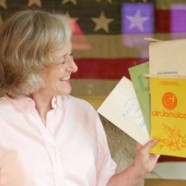
by Mary McCutcheon ’65
That infernal book by Marie Kondo has been on the best-seller list for months. I haven’t read it. I haven’t opened its cover. I haven’t touched it. I haven’t even seen a copy, but I am already barricading my mind against its painful message: decluttering.
When I first arrived at Milton in 1962, I had one Samsonite suitcase (no wheels), a portable typewriter, and a copy of Webster’s Sixth Collegiate Dictionary. Aside from children’s books and teddy bears, the only other thing I owned was my nascent and growing collection of airline vomit bags. These treasures stayed back home in Illinois.
Now 54 years have passed and I am moving to what I call my “Old Age Home.” I built it across the street, with all the handicap-accessible gizmos I will one day probably need. My worldly possessions, once fitting loosely into a Samsonite suitcase, have somehow turned into boxes and boxes and boxes of stuff. How did this happen? Is it time to call the hoarding task force?
One day a few years ago, my uncle Shaw McCutcheon (Milton Class of ’39) sent me a huge box of books and papers and things with a cover letter saying, “It looks as if you are now the family archivist…” I gulped with a mix of pride and dismay. I already had possession of my grandmother’s diary and this gave me enough mixed feelings as it was. My grandmother always told me that the minute she “popped” it would be my job to burn her diary. When she did pop and I acquired the diary, I briefly considered how and where I would start the promised fire. Somehow the match never managed to get lit and here is the diary still in my possession. The box Uncle Shaw sent included a lot of correspondence, manuscripts and my grandfather’s diary. My family was creative in art and literature, so a lot of these keepsakes deserve to be kept somewhere. Why not here?
I lose socks in the wash all the time. I ponder where in the space-time continuum these single socks got to, but, expecting their mates will one day return, I keep them. I have a whole drawer of mateless socks. There should be a Match.com for these lonely singles. The other day, I was putting a fresh pillow case on a pillow when, lo and behold, a sock popped out. With absolute rapture, I located its mate there in the drawer. I was delirious with self-satisfaction.
Then there’s the wrinkle cream. A walk through the aisles of CVS transports me into an imaginary world where I am radiant and my skin is clear and free of all sags and creases. The L’Oreal packaging with its gold lettering, the Revlon and Olay labels with their far-fetched promises, make me dream of the new me. I furtively pick up the product and put it in the cart. Meanwhile, back in the medicine cabinet at home are the jars and bottles from my previous trips to CVS. No matter how much of this stuff I slather on my face, whose surface area grows greater and greater as the wrinkles become deeper and more numerous, I can never use up my enormous inventory before the products lose their potency and become rancid. And can I toss them out? Well, not yet.
I could go on and on with a self-conscious inventory of my abundant stuff, but it brings out a degree of guilt and self-torment that I’m not ready to cope with. Though this essay is an exercise in self-defense, there is still plenty of ambivalence.
If I have problems parting with my clutter, I’m not alone. When my great-great-Aunt Bessie died, she left a large collection of snuff bottles, hundreds of bars of French soap, sexy nighties, and three or four silk parachutes she took on her trips to France to allay her fear of flying. My grandmother often wrapped these things up as gifts. My brother loved the parachutes, my sister liked the soap, and I wore one of the nighties for years.
My new house will be pleasantly cluttered. Marie Kondo is not going to be invited over.
In one of these boxes of stuff, I unearthed that long-lost collection of airline vomit bags and have started a conversation with the National Air and Space Museum here in Washington about accessioning them. So if you’re like me, find a way to keep the things that remind you of those you love and find a way to leave your descendants the things that reflect your own idiosyncrasies for better or worse. And then they can buy that copy of Marie Kondo’s book.



